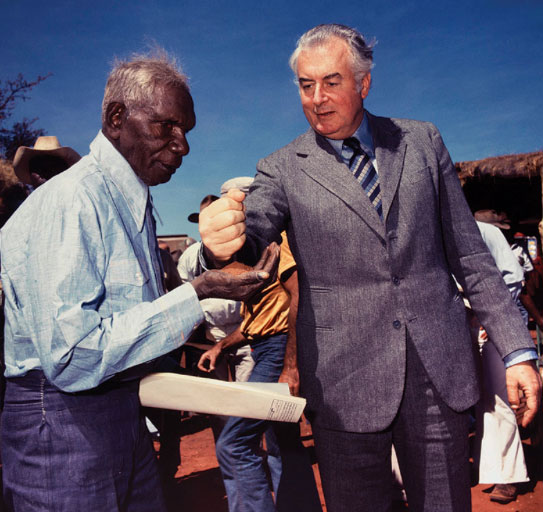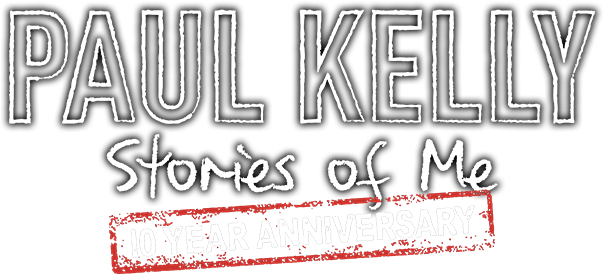Student’s Lesson
Songs about Social Change
One of the most significant events in Australian history has been the recognition of Aboriginal land rights. What began as a strike about wages and living conditions (Aboriginals were paid less than white men doing the same work) soon spread to address the more fundamental issue about a claim by Aboriginals for their traditional lands.
There are four student activities on this page.
Student activity 1: Analyse
Read and view the following representations of this incident
- A web page containing a fact sheet about the Wave Hill walk-off from the National Archives www.naa.gov.au
- A Short film from Screen Australia’s National Treasures series https://vimeo.com/441713826
- The Youtube clip of Gough Whitlam giving leasehold title to Vincent Lingiari, representative of the Gurindgi people https://youtu.be/FdpVBHxpArI
In small groups, take one of these texts and analyse its rhetorical qualities, considering
- who has created the text for what purpose(s) and for which audience(s)
- how it has been structured to achieve its purpose and engage the audience and
- its use of language.
Share your findings with the class.
Student activity 2:
Ballads have been an important form of cultural expression since the convict era. In modern times they have been seen as the poetry of the people through their connections with folk songs. They usually involve a story and have clear rhythm and rhyme scheme.
In small groups, prepare and present a readers’ theatre[1] rendition of one of the ballads below. Make sure that you cover both ballads across the class.
|
The Gurindji Blues |
From Little Things Big Things Grow |
| Poor bugger me, Gurindji My name is Vincent Lingiari, came from Daruragu, Wattie Creek station. Me bin sit down this country Long time before the Lord Vestey Allabout land belongin’ to we Oh poor bugger me, Gurindji.Poor bugger blackfeller; Gurindji Long time work no wages, we, Work for the good old Lord Vestey Little bit flour; sugar and tea For the Gurindji, from Lord Vestey Oh poor bugger me.Poor bugger me, Gurindji, Man called Vincent Lingiari Talk long allabout Gurindji ‘Daguragu place for we, Home for we, Gurindji: But poor bugger blackfeller, Gurindji Government boss him talk long we ‘We’ll build you house with electricity But at Wave Hill, for can’t you see Wattie Creek belong to Lord Vestey’ Oh poor bugger me. Poor bugger me, Gurindji Poor bugger me, Gurindji Oh ngaiyu luyurr ngura-u |
Gather round people I’ll tell you a story An eight year long story of power and pride British Lord Vestey and Vincent Lingiari Were opposite men on opposite sides Vestey was fat with money and muscle Beef was his business, broad was his door Vincent was lean and spoke very little He had no bank balance, hard dirt was his floorFrom little things big things grow From little things big things growGurindji were working for nothing but rations Where once they had gathered the wealth of the land Daily the pressure got tighter and tighter Gurindji decided they must make a stand They picked up their swags and started off walking At Wattie Creek they sat themselves down Now it don’t sound like much but it sure got tongues talking Back at the homestead and then in the town From little things big things grow Vestey man said “I’ll double your wages From little things big things grow Then Vincent Lingiari boarded an airplane From little things big things grow Then Vincent Lingiari returned in an airplane From little things big things grow That was the story of Vincent Lingiari From little things big things grow |
These songs are both ballads about the same event and yet their effect is quite different. Analyse the contrasts in these songs considering
- their approach to telling the story
- the treatment or meaning of ‘place’
- their choice of language and syntax
- the effect of the rhyme
- their tone.
Now listen to
- the Gurindji Blues https://youtu.be/EdLIlyhLewI
Written in 1969 by Ted Egan and recorded then by Galarrwuy Yunupingu, this recording of the song sold 20,000 copies and it financed the tent embassy in Canberra for its first six months. - From Little Things Big Things Grow, first played in 1991.
Ballads traditionally use tunes reminiscent of folk melodies.
-
How are audiences (Aboriginal and non-Aboriginal) positioned to be accepting of the message of these songs? Consider the balladic form, their tune and point of view.
[1] MyRead website: https://www.aate.org.au/products/drama-and-shakespeare-in-the-classroom/drama-reloaded
Student activity 3: Class Parliament
The issue: which is the more effective as a protest song?
- Students who think that The Gurindgi Blues is the more effective protest, move to the right side of the room and those preferring From Little Things Big Things Grow moving move to the left.
- Take turns (alternating the right side and the left) to present a point to support your case. Any class member can make a point as long as he or she stands to make it and each point is backed up by evidence from the text. Try to convince as many people as you can to “cross the floor” through the strength of your argument.
- At the end of the discussion cast another vote.
Watch the advertisement for Industry Superfunds https://youtu.be/voXdaY4RGtA
Note: Superannuation is the money you put away during your working life to ensure you have enough for your years of retirement. Your employer is obliged to pay an amount of money, broadly based on your salary to supplement these savings if you retire over a certain age.
Class discussion:
- Why do you think Paul Kelly’s song was chosen as the signature tune for this group of companies?
- How does the advertisement keep to and/or work against the original intention of the song?
- To what extent does changing the purpose and context of art damage its message?
Student activity 4: creating
Your class is producing one episode of a television series called “Behind the Scene” in which iconic images from Australian history are fleshed out with the actions and motivations of people associated with the event.
Your group will choose one of the following
- Gough Whitlam
- Vincent Lingiari
- Lord Vestey
- workers from the Gurindji
- the photographer of this image, Mervyn Bishop.
Use the information you have gained from the texts above, develop a photomatic presentation (a series of stills presented in sequence with a voice over) to show how your section of the program could be shot and edited together.

Returning traditional lands to the Gurindgi people in August 1975, Gough Whitlam pours soil into the hands of Vincent Lingiari. Photo credit
AN AUSTRALIAN VOICE / SONGS ABOUT LIFE
